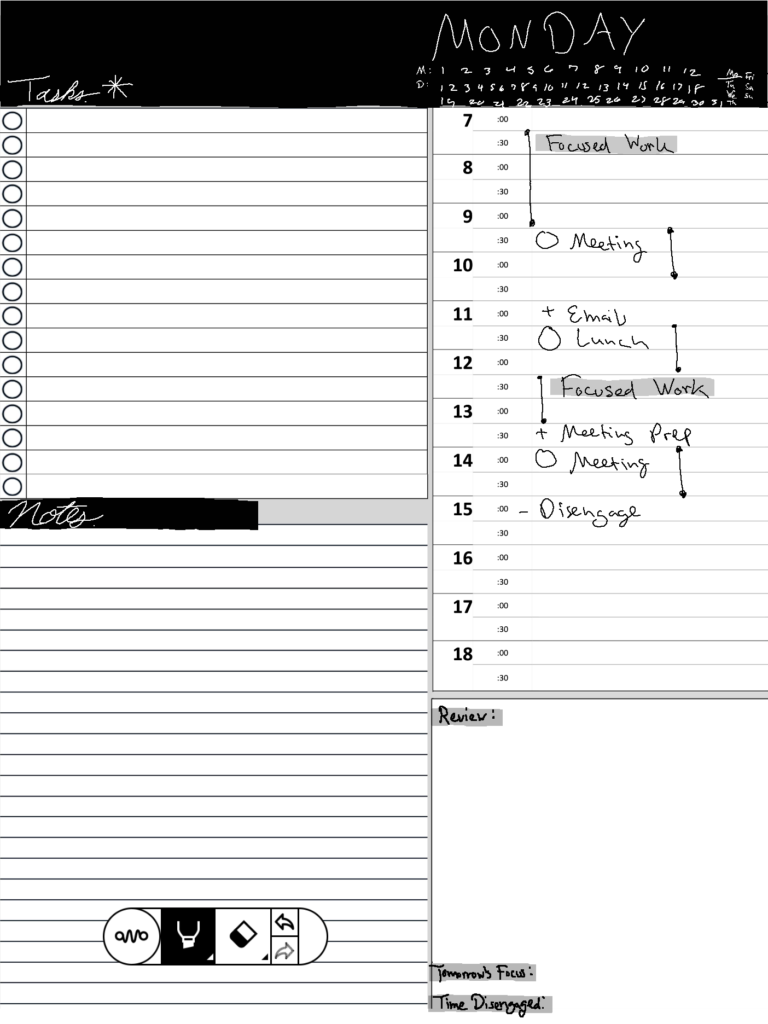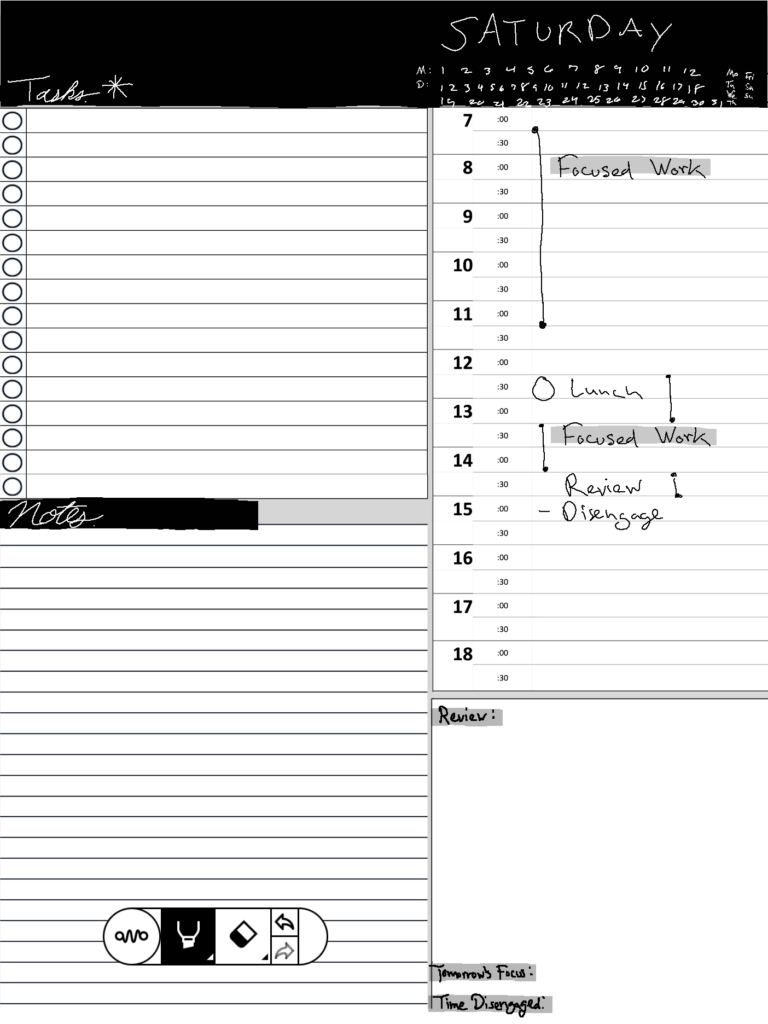
I work on (most) Saturdays: here’s why | postdoc diaries, #1
Since I was a graduate student, I planned work for most Saturday mornings. Now, as a postdoctoral researcher, I continue with that tradition. Working on Saturday has helped me to be more efficient with my work. It allows me to have deeper work sessions without the typical responsibilities and interruptions from a normal workday, including email responses, meetings, and talks. The expectation for a response or meeting is much lower on weekends than on week days, and this allows for longer periods of focused work.
Pros of working on Saturday
Because the expectation for response is low, work on Saturdays involves little to no interruptions. Scheduling meetings for Saturdays, at least in academia, is rare. While some still respond to emails and messages, there should be no expectation to work on a “traditional” day off. Most people don’t work on Saturdays, which means it’s unlikely for other people to want something from you on that day, making the work session less fragmented and go more smoothly.
When I was an undergraduate student, research was almost, dare I say it, easy. This isn’t to say that the research wasn’t rigorous, but during my research experience as an undergraduate student, I had many long stretches of uninterrupted time. I remember being able to work in the university library in an individual study room and draft research manuscripts for up to 5 hours, uninterrupted. There were no weekly standup meetings. There were few emails. There were minor responsibilities and service obligations required of me. That level of free time is not so readily available as expectations increase, as normally happens with graduate, postdoctoral, and faculty positions. Even with extra responsibilities, we can prioritize periods of focused work using certain techniques.
I have learned that the simplest way for me to find periods of focused work is to prioritize that time for Saturday mornings. Saturday is the last day of my work week and my most anticipated work day because of the focus that it allows for. This makes Saturday my most efficient work day. Sunday is my obligatory day off (which I will discuss more in a future post).
Knowing that I will take Sunday off places some urgency on my weekly schedule. There is a clear stopping point for my week, which doesn’t allow me to perpetually drag out my tasks. I have to get done what I need to get done by Saturday. Otherwise, it will have to wait until the next week. This scheduling system works for me because (1) Saturday allows for focused, uninterrupted work (2) Saturday gives me time to review the past week and plan for the next one, and (3) Sunday is a definitive rest period. There are exceptions to this rule for unanticipated deadlines, but it’s rare for me to work on a Sunday.
Cons of working on Saturday
Working on Saturday is not always ideal. There are several drawbacks. First, if you decide to work on Saturday, you lose some of the traditional, two-day weekend. This time loss cuts into some opportunities for social activities when most other people are free to get together and engage outside of work. However, it should be noted that Saturday work does not have to last all day. It could just be part of the early morning and leave time to socialize later in the day.
Nonetheless, working on Saturday is not always practical, especially for people with inflexible responsibilities. For example, people with young children, other dependents, or secondary jobs may not be able to dedicate an alternative workday to their primary job, especially on weekends when schools and daycares may not be open. If there are responsibilities that interfere with a Saturday work schedule, there are other alternatives.
alternatives to saturday work
There are other options to finding focus that do not require working for more time or adding an additional work day to your schedule. One is to trade another day of the week for Saturday. For example, you might decide to take Wednesdays off instead of Saturdays. This is an alternative that does require Saturday work, but you would still maintain a typical 40-hour work week, not 40 hours + Saturday mornings. Grey, a co-host of the Cortex podcast, has referred to this as the “Weekend Wednesday.”1 Wednesday might be a good day to take off because it is in the middle of the week when a lot of us start to feel tired and unmotivated. But, of course, this isn’t true for everyone. Wednesday could be traded for any other day that works best for your schedule.
Days with multiple meetings sometimes limit periods of focused, individual work. I sometimes work less on days that I have several meetings on my schedule, as I know from experience that I can’t get into focused work sessions when my day is fragmented into multiple time segments. For example, on days that I have 5 hours of meetings, I might only work for those 5 hours instead of trying to work on any important individual projects. This is especially the case when the meetings are spread throughout the day instead of consolidated in one block, which gives little room to focus for several hours at a time. Thus, instead of trying (and failing) to focus, I schedule my focused, individual work for a different day and take free time or do admin work in-between meetings (see example schedules below)2.


There are several other alternative scheduling options that do not require working on Saturday. Each of these options involves finding (or forging) periods of uninterrupted focus.
- Start work early in the morning before the typical 9 AM start time or finish work later in the night after the typical 5 PM stop time.3
- An early morning work period can allow for deep focus. Giving yourself at least 1-2 hours of uninterrupted time to work on individual projects can boost work productivity on projects that require that level of focus, including research manuscripts, grant proposals, lesson plans, and study sessions. Since normal work hours start at 9 AM, people don’t expect meetings or email responses before that time. This allows for guilt-free, individual work.
- Minimize meetings if you need more time for individual work.
- Meetings are great for collaboration and sometimes for progress updates, but too many meetings can hamper deep thought and individual work.
- Only have meetings when they are necessary and useful. If an issue can be handled over a single email exchange, it may not require a meeting. However, if there is constant back and forth on an email thread with little progress on an issue, it may be easier (and quicker) to meet instead.
- Meetings do not have to last for the stereotypical hour or half hour. Time limits should be set before the meeting, but once the issue of interest has been discussed, they do not need to be dragged out to meet that specified time.
- Batching meetings can help facilitate focused work periods. For example, you might choose to have all of your meetings from 12 PM to 3 PM. This would allow time for individual work at the beginning (9-12) or end (3-5) of the work day. While batching meetings can be helpful, it’s more effective when there is a buffer period between meetings. I like to allow at least 15 minutes between meetings to process notes and recharge before starting my next meeting.
- Having meetings within consolidated time periods may also allow for no meeting days. Saturday is the best option for me to plan for a “no meeting day”, but people who have more flexibility and agency over their schedules might opt for refusing to schedule meetings for at least one day during the work week.
- Treat email and messaging like any other task (Batch and schedule them!).
- In the same way that batching meetings helps with forging time for focused work, batching emails and messaging operates in the same way.
- For example, on a typical day, I do not check my work email or messaging before 10 am so that I can have at least one early period of a focused work.
- It may also help to schedule emails and responses for a certain period of time during the day. Setting a time limit on processing responses can force a definitive stopping period for communication. I like to give myself no more than 30 minutes per day to handle emails and messaging. However, this limit is flexible, and it varies based on the current needs. Some days may require more (or less) communication than others.
- Email responses can be handled like any other task. The Spark email app and Things 3 task manager do a good job of exporting emails as tasks to deal with when appropriate. With Spark, emails can be exported directly to the Things 3 to-do list. Spark also allows for exporting the email as a PDF or external link. This is useful for processing an important email without the distraction of seeing new emails come in while trying to respond to one.
Work and study schedules can be flexible
Your work schedule does not have to be a typical 9-5. Academics may need to adjust their schedules to fit their responsibilities and energy levels. While working overtime is often not the answer to achieving more focused, meaningful work, thinking more about our best work times based on our circadian rhythms, chronotypes, and preferred work conditions helps us get the most out of our work sessions. If you’re barely awake at 7 AM, that’s probably not the best time for you to do your best work. Alternatively, if you fit the morningness type like me, early mornings might be your most productive period for individual work.
In any case, everyone is different. Some academics enjoy working slowly in the evenings when they can take their time after their kids have gone to sleep. Others get their best work done from a religious 9-6, Monday through Friday, work schedule and never work on weekends. Some academics keep their momentum by working 5-6 hours every day, Monday through Sunday.
I hope that your schedules accommodate your needs and allow you to work efficiently. For me, there is nothing quite like the peace of working on a quiet Saturday morning with the understanding that the next day is my obligatory day off.
––––––––––––––––––––––––––––––––
NOTES
1 listen to full podcast that mentions the Weekend Wednesday here: https://www.relay.fm/cortex/118
2 The scheduling examples are made with the Supernote A6x using a modified version of the CPO planner (https://www.reddit.com/r/Supernote/comments/rm7ym1/2022_cpo_supernote_plannerpdf/)
3 I do not recommend starting work early and finishing work late. These alternative scheduling options are best implemented in a way that is mutually exclusive. Choosing one or the other allows for a reasonable amount of free time to relax from work. Limiting work schedules also allows time for other important activities, including social engagements, physical activity, leisure hobbies, and sleep. This balance facilitates better work.
Enjoyed this post and want to say thanks?